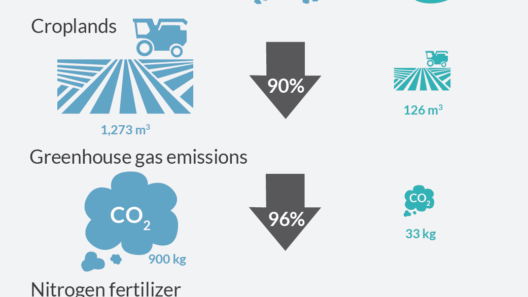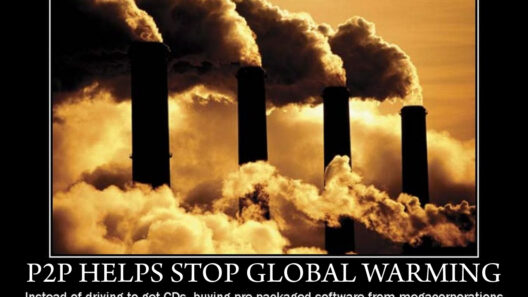Global warming, a phenomenon exacerbated by human activity, has far-reaching consequences that extend into the depths of our oceans. Among these consequences is the alteration of ocean currents, which are pivotal in regulating both marine life and the overall chemistry of seawater. Understanding how global warming reshapes ocean currents invites a renewed perspective on the intricate relationships within Earth’s climatic system and piques curiosity about the future of our planet’s ecosystems.
Ocean currents are massive rivers of seawater that flow through the world’s oceans. They are driven by a combination of wind patterns, the Earth’s rotation, the gravitational pull of the moon and sun, and the temperature differences between equatorial and polar regions. These currents play an essential role in distributing heat, nutrients, and gases across vast distances, thus maintaining the delicate balance necessary for marine and terrestrial life. However, the incremental rise in global temperatures is altering the key factors that influence these currents.
One of the most significant changes occurs in the density of seawater, influenced by temperature and salinity. As temperatures rise, water expands, and polar ice melts, leading to an influx of freshwater that can dilute salt concentrations. This alteration in salinity and temperature disrupts the thermohaline circulation, often referred to as the “global conveyor belt.” This circulation is crucial as it transports warm, nutrient-rich water from the equator to polar regions while returning colder water toward the equator. The interruptions can lead to dramatic changes in marine ecosystems, potentially reshaping species distribution and abundance.
Moreover, ocean currents not only affect marine life but also impact global climate patterns. The Gulf Stream, for example, is responsible for bringing warm water from the Gulf of Mexico to the North Atlantic, significantly influencing the climate of Western Europe. Should global warming weaken this current, Europe may face harsher winters and cooler temperatures, illustrating the interconnectedness of ocean currents and atmospheric conditions.
The implications of altered ocean currents extend deep into the realm of marine biodiversity. Many species of fish and other marine organisms have evolved to thrive within specific temperature and current patterns. As these currents shift, species may find themselves in environments unsuitable for their survival. For instance, species like the Atlantic herring rely on certain current patterns for spawning. Disruption could lead to the decline of these populations, thus affecting commercial fisheries and local economies dependent on them.
Additionally, nutrient cycling is heavily influenced by ocean currents. Currents help distribute essential nutrients in the ocean, supporting primary productivity, which is foundational for marine food webs. Changes in current patterns could lead to altered nutrient availability, resulting in plankton blooms or dead zones—areas devoid of life due to diminished oxygen levels. Such environmental changes can precipitate the collapse of complex marine ecosystems.
Climate change is intensifying the frequency of extreme weather events, which further complicates the dynamics of ocean currents. More robust storms can cause significant disruptions, leading to the mixing of layers within the ocean and affecting temperature and salinity gradients. This increased variability can make predicting future current patterns and their repercussions increasingly difficult, warranting significant scientific inquiry.
The projections surrounding these transformations call for urgent attention. The United Nations’ Intergovernmental Panel on Climate Change indicates that without immediate action to reduce greenhouse gas emissions, the impacts on ocean currents will escalate. As sea levels rise and temperatures climb, the ensuing changes will not merely be regional—they will resonate globally, impacting every country tied into the complex web of marine interdependence.
Fostering a deeper understanding of these shifts also provides an opportunity to implore for action. The urgency of the situation demands innovative mindsets and collaborative efforts across nations to mitigate climate change effects and implement adaptive management strategies for marine resources. Initiatives aimed at enhancing marine protected areas and promoting sustainable fishing practices can embody measures to combat the impending threats posed by shifting ocean currents.
Moreover, engaging in a comprehensive dialogue around mitigating climate change enriches public interest in conservation efforts. The challenge lies not only in fostering awareness of the scientific underpinnings but also in inspiring individuals and communities to take principled action. Educational campaigns can emphasize the significance of ocean currents in everyday life, from climate regulation to the sustenance they provide.
Curiosity must transition into action. The shifts in ocean currents as a result of global warming manifest a broader narrative about our planetary future. Every individual has the capacity to become an advocate for the oceans by supporting policies that combat climate change, reducing carbon footprints, and engaging in responsible consumer practices. Understanding how global warming reshapes ocean currents can assist in redefining our relationship with the oceans and encourage stewardship that safeguards these vital ecosystems for future generations.
In conclusion, the chemistry and life of the oceans are intricately bound to ocean currents, and the dire consequences of global warming threaten this balance. By cultivating informed narratives on these shifts, there exists significant potential to inspire collective action. The future of our oceans rests upon this transformation—one that underscores the belief that the fight against climate change is not just about preserving the past but fostering a sustainable future. It is a call that demands urgency, a call that can no longer be ignored.







